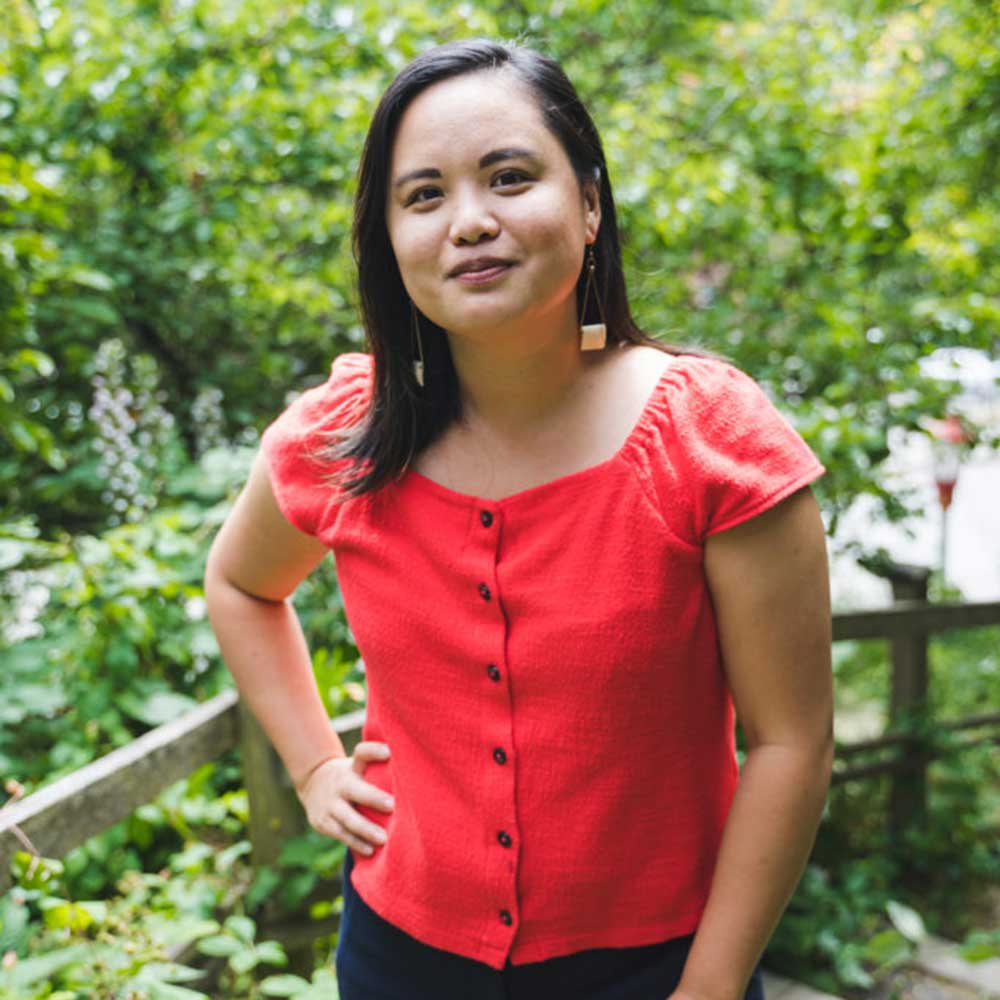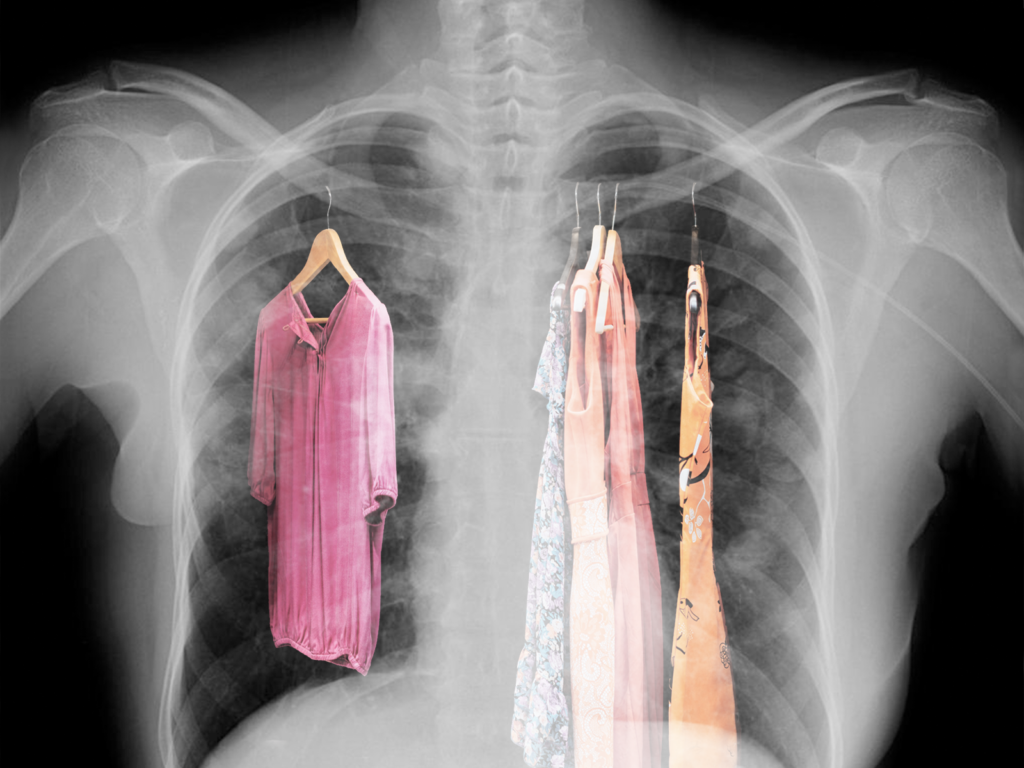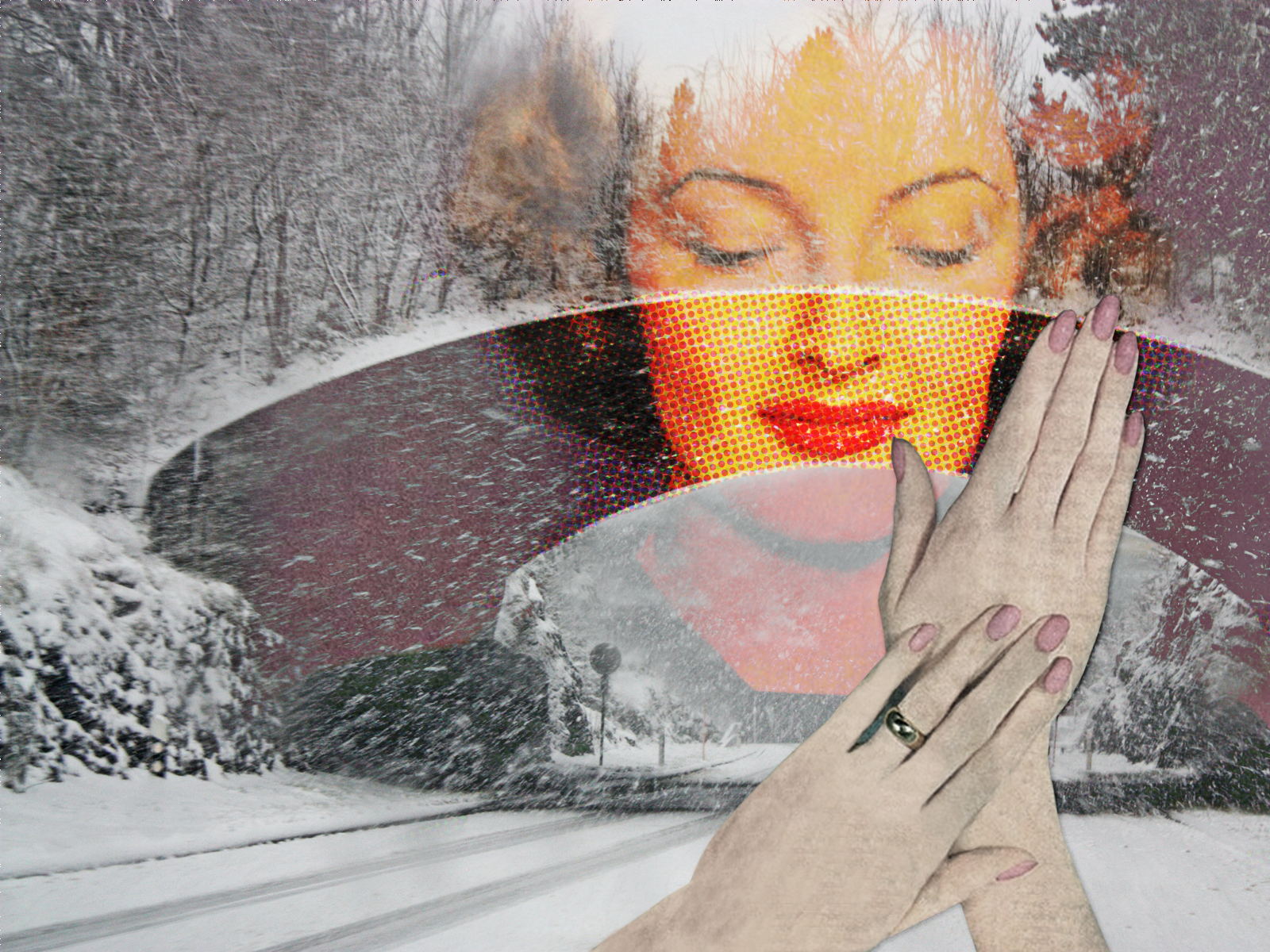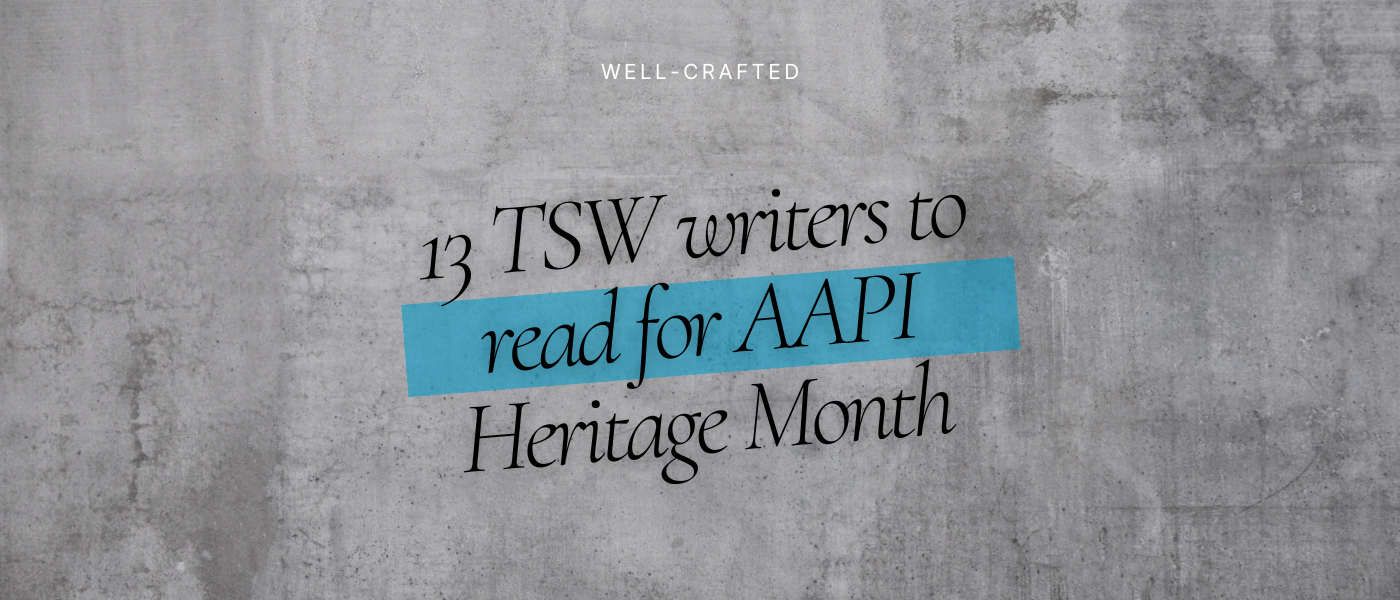The true cost of dying lies beyond the sick. It buries itself in the people who try to love the sick. There are more obvious costs like medical bills, hospital parking fees, days not worked, different food regimens, softer foods, acupuncture appointments and Chinese herbs to delay the side effects of decaying. Then there are invisible costs, like regular therapy appointments, massages to get to the stuff therapy could not, weight gain, weight loss, weight gain again, take-out because who wants to cook or eat said soft food, new questions to answer, new treatment options and medications to consider. There’s a low-grade decision fatigue that starts to build in your chest. It takes over your breath, shortening it for ease. At some point, the question is no longer how can the sick get better, but how can the dying be easier?
I inherited my mother’s nipples. They are dark and bulge in a way that makes wearing white, or any color for that matter, nearly impossible without a thick, padded bra. I was eight years old the first time I really noticed hers. She had just gotten home from a long shift at the restaurant and I followed her to her room with all my longing. I talked about my school day and she rubbed her eyes, half-listening. Her hair smelled of dirty grease and her work apron was stale from old cigarettes. My mother undressed to shower and I hesitated momentarily. Should I look away? Why was I suddenly shy? She wasn’t shy, so I kept talking and she kept half-listening.
I learned English from the likes of Animaniacs, Rugrats, and, I’d like to think, The Simpsons — but I can never quite be sure. Preschool definitely played a big part too, but there’s also no way of verifying. No one to cross reference my memory with anymore. I went from speaking entirely Mandarin at home to being a full-fledged English speaker one morning. Or at least, that’s how it felt. I’m sure it was more gradual, with a few more stumbles than I recall, but at some point my ability to translate for my mother became essential. I don’t remember the time in between languages, only that English was the priority. My tongue eventually adapted, and my Mandarin started to taste less natural. I lost the nuances of tone and forgot simple inflections that signify changes in meaning.
Mā/ 媽 / mother
Má / 麻 / hemp
Mǎ / 馬 / horse
Mà / 罵 / scoldI likely called my mother a horse many times — or “scold,” which is slightly more poetic. She was apathetic about correcting me. New sounds had filled my mouth and I could no longer teeter elegantly between two voices.
Translation operates under the assumption that the speaker is rooted in two languages equally and thus plays a sort of bridge between them. But what happens when one side is cut off, neglected and believed unnecessary?
I had a lot of toothaches as a kid, and hence, was a reluctant regular at the dentist. My mother never quite sat me down to have the “Take care of your teeth, they’re the only ones you have,” talk. Perhaps this was because her parents never quite sat her down either. During one visit as a 10-year-old, my mother was filling out another new family history form and didn’t understand the sentence “check all that apply.” So she checked all the boxes. Alzheimer’s Disease. Arthritis. Asthma…Venereal disease. Yellow Jaundice. The receptionist had baby blue scrubs on, wavy blond hair that I wanted to touch, and mini-charm pins latched to her lanyard: a tiny studded football, a miniature Starbucks coffee mug, and a string of yellow smiley faces. “No, only ones you or your family have had,” she laughed, handing my mother another blank form.
My mother still didn’t understand. I translated for her, and laughed too, I think so that the receptionist would like me. My mother checked none, but she should have checked seven.
I have questions about the causes of breast cancer. What is science, what is trauma, what is random, and what is deliberate? My mother never had just one primary doctor. Growing up, we moved frequently, ironically always within the same suburb in San Diego — once, she thought the apartment number was giving her bad luck, so we moved directly next door and did not warn the new tenants. I got used to keeping my clothes in lavender plastic bins to make moving easier. Plastic bins make everything easier, say working mothers everywhere. So logically, we also frequently changed doctors. Was it common practice to run a clinic special in the 1990s — Kids Seen Free for First-time Visitors — and was that why my mother tried to find as many clinics as possible before we had to pay for a second visit? Did she mistrust them? Did she change doctors each time she got frustrated with trying to explain herself?
My mother’s breast cancer was the easily detectable kind, commonplace amongst older women, especially women of color. She was 63 years old when she was diagnosed with stage four breast cancer. She kept it from me for more than eight months. We hadn’t been talking much, so I couldn’t blame her. Our monthly phone calls were often limited to, “Did you eat yet?” and “Work OK?” I would half-listen to her, and mumble back my responses. I was 28 years old and the Executive Director of an organization I learned could barely make payroll. Something about trying to explain that in broken Mandarin felt exhausting.
I got a call from her on a Friday evening after grabbing a drink with a friend. I ignored the first call, but she tried again. She told me about the diagnosis in a small voice I’d never heard before. The cancer had spread to her bones. I asked questions that she didn’t know the answers to. I asked questions I know I shouldn’t have asked: What did the doctor say? What was her plan? No response. I cried. I told her, we’ll fight it. She cried. She told me she was tired of fighting.
Transcription: Swedish Medical Oncology Clinic Initial Evaluation
Authorizer: Ellis, Erin D, MD
12/15/2015The patient is self-referred for ongoing care of metastatic breast cancer. The patient recently moved to Seattle where her daughter lives.
It sounds like her care has been somewhat fragmented. The patient had been living in Las Vegas up until this spring when she visited her native country, Taiwan, to seek evaluation of back pain. There, she was diagnosed with locally advanced breast cancer. Unclear if she had staging exams.
She apparently did not receive any treatment for her breast cancer but returned to the United States in August. In September, she presented to the Emergency Department in Las Vegas with shortness of breath and was found to have malignant cells consistent with her breast cancer. She saw a clinician who started her on tamoxifen and pamidronate. Unclear when her most recent dose was given.
Per the daughter the patient has had chronic back pain that preceded this diagnosis. The daughter thought it was occupational.
Pain is both deeply intimate and universal. My mother complained of back pain throughout her four years of metastatic breast cancer. None of her scans showed that the cancer spread to her lower back, but forty-four years of working in restaurants made its way there. Her back pain kept her up at night and curved her into strange stretches every morning in an attempt to unwind itself. As a child, I walked on her back after shifts, attempting to stomp the stiffness away. Her back pain was the one pain that she understood the most, the one that made sense to her and the one that she likely inherited from her mother. She knew this pain’s origin story; it weaved itself into the base of her spine for safekeeping. It was hers, not cancer’s, not mine.
Things I did not know, until I Googled them:
- It is illegal for family members to translate during health care visits. Federal and state laws require that healthcare organizations provide language access, especially for institutions receiving Medicare or Medicaid. The technical skills medical translators have protect patients and lead to more accurate diagnosis and treatment plans. However, what is law and what is practiced are often two different things.
- If a hospital is well-resourced and your language is considered common in the region, a free in-person medical interpreter will accompany you to your visit. Sometimes interpreters are stretched thin and shuffling across town from other appointments, but are still available over the phone or video.
- In old hospitals, only an interpretation hotline is available. A special phone is used, one with dual handsets so that the patient and doctor can talk on the same device. I have a photograph of my mother using one. Her eyes are droopy and she looks tired, but also slightly annoyed. Like she needs it but she refuses to believe she needs it, kind of annoyed. The phone is cerulean blue and is a stark contrast against her pale green hospital gown. The moment after the photo is taken, she hangs up the phone, and the doctor starts to address me. I ask questions that I couldn’t ask during the interpretation. He doesn’t make eye contact with my mother and I’m too busy taking notes to correct him. To pause and interrupt his behavior to show him what dignified patient care should look like. I want him to answer my questions. I want him to walk me through the new treatment options one more time. I want him to spell out the words I do not understand, so that I can Google them afterwards. My mother is exasperated and turns over in her hospital bed.
Transcription: Swedish Medical Oncology Clinic
Authorizer: Ellis, Erin D, MD
06/01/2016Patient returns accompanied by her daughter and a medical interpreter. She has decided to return to Taiwan. It sounds like this decision was made fairly quickly.
The patient called — or rather, her daughter, Lisa, called — on a weekend when the patient was simply not getting out of bed. She was sleeping all the time. Of note, I had started her on Lexapro at her last visit. She took it for 2-3 days. She also met with a counselor at the Asian Counseling and Referral Service. She ultimately discontinued the Lexapro after a couple of days. She seems like she is in better spirits today. She states this is because she is returning to Taiwan. Her daughter is quite worried though that her mother intends to simply discontinue treatment. That prompted us to go back over her last CT scan of the chest, abdomen, and pelvis. This showed sizable effusions bilaterally [cancerous fluid build up in the lungs]. Remarkably, she is really not having pulmonary symptoms at this time.
Two weeks after this last check-up, my mother moved back to her hometown of Hsinchu, Taiwan. She was happy at first. She had a favorite dumpling stand, a lady who did her nails once a month, and a hair stylist who kept her up on neighborhood gossip. She saw her doctor every month. She started new medications, a new treatment plan that included radiation this time. Possibly chemotherapy sessions too. She never told me. My mother knew the nurses’ names and where her doctor studied medicine. I made the trip over to visit and she whispered in Mandarin, “No one even knows I’m sick,” as we walked to the outdoor market.
Eventually, though, the distance ate at her. Living with her brother and his wife started to weigh heavy. She missed quesadillas and bread that wasn’t sweet. She missed clean air. She wanted to come back to Seattle. Four months later, she moved in with me and stopped treatment completely. It bought her another 18 months.
I’m glad she died before the pandemic.
She never wanted to be buried in the earth, so I spread her ashes in the low desert.
I wonder what my breath would be like now if she hadn’t died yet.
What kind of food we’d spend all day cooking. What kind of food we’d order in.
What movies we’d re-watch together.
If I would hold her hand differently.
Or ask for more childhood stories while we quarantined.
What kinds of herbs would gift her a peaceful sleep?
And how her love for walks would change.
What kind of noise I’d make if she got this virus, too.
And what her doctor would say through the medical translator over Zoom.
Edited by Briana Gwin and Joyce Chen.




